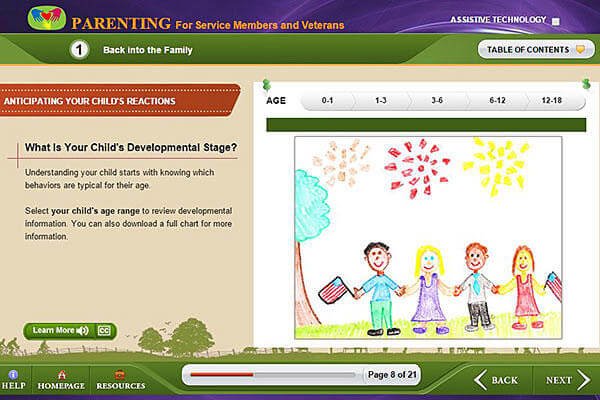Being a military parent can be tough. Parenting for Service Members and Veterans is a free and confidential online course designed by and for service members and veterans to equip fellow military parents with resources to reconnect with their children and bring families closer together.
The course features real military families and their personal experiences and offers approaches to use with young people of all ages. Here are 10 tips from the course that military families should know:
1. Invite your child's questions. You may think that if your kids are not asking questions, they are OK. However, pay attention to indirect messages -- if you never mention your deployment, your children may follow your lead and not ask. Being open about your service may make your kids more comfortable.
2. Be prepared for tough questions. Remember your child's questions are their way of trying to make sense of your absence and return. If your child seems angry, be patient and invite him/her to tell you about the hardest parts of your absence. Questions are often a child's way of wanting to be reassured that they are safe.
3. Take care of yourself. Improved mental and physical health can make you a better parent. Identify simple things you can do throughout your day to relax or decrease your stress. You are not only recharging your own batteries but also setting an example for your child to care of themself.
4. Recognize when you need a break. The first step to managing your stress is making it a priority. Be mindful and learn to listen to your body. Headaches, an upset stomach, or forgetting things can be signs that you need a break. The sooner you recognize these signs, the better you'll get at taking action -- BEFORE you blow your top.
5. Switch gears between work and home. Career and job demands often create stress, which can follow you home and affect your loved ones. Practice deliberately "switching gears" between work and home. When you get home, create a routine that helps you make this happen. Turn off your work phone, play with your baby, or make a plan to have a few minutes of "alone time" when you walk in the door.
6. Think about your own emotions. Children can really push buttons and it can be easy for parents to lose their temper. The more aware you are of your own emotions, the better in control you will be and with greater control, you will make smarter decisions.
7. Use a positive approach. Discipline works best when there is good parent-child communication and a warm, supportive relationship. You don't have to be your child's best friend and you don't always have to teach, guide or control -- sometimes you can just enjoy being with this incredible human being who is your child!
8. Look beneath the surface. Children and teenagers are still learning how to handle intense feelings and emotional pressures. Misbehavior often indicates that they are struggling with managing certain emotions. For example, your child may refuse to go to school because they are worried about taking a test. If you focus only on their behavior ("Get to school, young lady, or else!"), you miss the opportunity to help your child learn how to cope with their various emotions, worries and insecurities.
9. Discuss the tough stuff. Raising sensitive or emotional issues at home is difficult, but it can help you reconnect as a parent. By bringing up difficult topics, you send a powerful message that your family can get through challenging situations.
10. Have a plan. Determine topics that are and are not up for discussion. Practice a kind way of saying, "I understand you are curious, but I don't want to talk about that now." Sometimes questions will just come up out of the blue, but you may also want to set aside a special time to talk with your child about an uncomfortable topic. Focus on hearing what your child thinks and feels about the situation, not on explaining or justifying your viewpoint.
-- For additional insight and information on how to navigate the challenges of military parenthood, visit the Parenting course. The course is free and completely confidential with no log-in information is required.
Parenting for Service Members and Veterans was built by the Department of Veterans Affairs Mental Health Services in partnership with the Department of Defense National Center for Telehealth and Technology (T2) as part of a coordinated public health initiative to help veterans and service members who are having difficulties.
Keep Up with the Ins and Outs of Military Life
For the latest military news and tips on military family benefits and more, subscribe to Military.com and have the information you need delivered directly to your inbox.

















